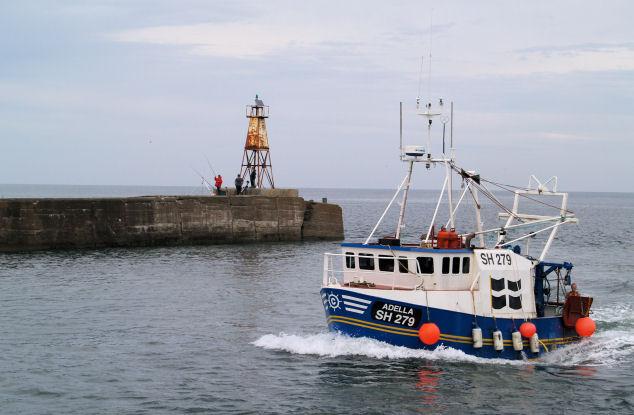Small scale fishermen triumph – no one can own the fish of the sea
In the High Court last week judgement was given in an important case affecting the rights of small scale fishermen. On one side stood the New Under Ten Fishermen’s Association (NUTFA) representing small inshore fleet fishermen, on the other the United Kingdom Association of Fish Producer Organisations (AFPO), a trade association which almost exclusively represents large fish producers. David and Goliath. The main protagonists, however, were AFPO and the Secretary of State for Environment, Food and Rural Affairs (Defra) who is responsible, under Article 20(3) of Regulation (EC) 2371/2002, for allocating the UK’s fishing quota within the terms of the Common Fisheries Policy (CFP).
NUTFA was, with Greenpeace support, an intervener in the proceedings. NUTFA is dedicated to the support, survival and development of the under ten metre fleet (vessels under 10m in length) which comprise the inshore fleet. Over 95% of the UK's quota is allocated to fish producer organisations made up of industrial-scale vessels that are often foreign-owned, while small vessels make up 75% of the UK's fleet and supply two-thirds of seagoing jobs on the UK’s fishing fleet of some 3,000 registered vessels.
In 2009 Defra established a project called ‘Sustainable Access to Inshore Fisheries’ which was supported by an independent advisory group. The aim was to develop a strategy for the long term future of the English inshore fishing fleet. Defra recognised the difficulties caused by an imbalance between fleet capacity and permitted fishing opportunities, attempts to encourage gifts of unused quota to the under 10 metre inshore fleet had come to nothing.
In April 2011 Defra published a consultation document setting out proposals for the transfer of quota to the under 10 metre inshore fleet which transferred consistently under-used quota and a small 3% redistribution of fixed quota within the English fleet. Defra acknowledged that small scale fishing, and fleets in communities with a fishing heritage, had the potential to deliver cultural, environmental and economic benefits. On 10 February 2012 Defra announced that it would be implementing proposals to make a permanent realignment of quota associated with consistently underutilised quota and a reduction in quota allocated to AFPO in favour of the inshore fleet to maximise the available quota under the CFP.
The AFPO challenged Defra’s decision by way of judicial review, arguing that it deprived AFPO fish producers of a valuable entitlement, without compensation, and gifted it to the inshore fleet, citing the following grounds in support:
- The decision unlawfully frustrated the legitimate expectations of holders of the 7,901 fixed quota allocation units identified to be reallocated. Since 1999 the system had guaranteed fishermen and their producer organisations a fixed percentage share of the UK quota.
- It frustrated the legitimate expectation that quota allocations associated with fixed quota allocation units would not be lost if a fisherman does not fish the full allocation. The Secretary of State can abandon the fixed quota allocation scheme or reduce the amount of the UK’s total allowable catch allocated under it, but this must be done prospectively, not retrospectively as had happened in adopting 2007-10 as the reference years for assessing under-use. This denied fishermen the opportunity to change patterns of fishing behaviour.
- Furthermore, alternatives should have been more extensively explored. A pilot could have been run to see if the additional quota would have been used by the under 10 metre fleet.
- The decision involves an unlawful deprivation of, or interference with, possessions protected by Article 1 of Protocol 1 to the European Convention on Human Rights and Article 17 of the European Union Charter of Fundamental Rights which both provide that persons may not be deprived of their possessions, except in the public interest in accordance with the law.
- The decision breaches the EU prohibition on discrimination, which requires that “… comparable situations must not be treated differently … unless such treatment is objectively justified”. In brief, only English fish producers who are members of English producer organisations are affected, yet the beneficiaries are members of the whole UK inshore fleet.
Mr Justice Cranston provides a comprehensive analysis of the law on legitimate expectation under both domestic and EU law. In his judgement he identifies 10 propositions which characterise legitimate expectation under domestic law, the first being that the undertaking relied upon must be clear, unambiguous and without relevant qualification, and concluded:
"In my view the claimant’s legitimate expectation ground falls at the first hurdle. There has been no clear, unambiguous and without qualification undertaking that the fixed quota allocation system would continue in its existing form."
In turning to the question whether a quota allocation could constitute a possession for the purposes of the Convention or the Charter, Cranston J referred to the principle invoked by NUTFA that fishing stock is a right held by the public and permissions to fish cannot be privately enjoyed as a property right and cannot constitute a possession, especially when they have been conferred on fishermen free of charge.
"For better or worse the concept of possessions has been given an expansive interpretation. The claimant’s analogy with the English law notion of profit a prendre does not hold up since no one can own the fish of the sea." (emphasis added)
Cranston J concluded that the decision constituted neither an interference with nor a deprivation of possessions. In any event, any interference or deprivation is in accordance with the law and justified. The decision is not in breach of any substantive legitimate expectation nor is it retrospective. The terms of the decision are clear and in accordance with the discretion possessed by the Secretary of State.
Finally, so far as discrimination was concerned, Cranston J was having none of it:
"In my view there was no discrimination. Public policy making can rarely be the finely tuned exercise forensic analysis demands. As far as was practicable this was a carefully calibrated exercise of attempting to identify unused quota which would be fished by the under 10 metre fleet."
The AFPO’s claim failed and small scale fishermen around the UK are all the better for it. As Jerry Percy of NUFTA said:
"This ruling gives the minister the opportunity to review the entire basis of allocating fishing rights and provide a lifeline to the smaller-scale fishermen who are the lifeblood of many coastal communities."
Click here for a copy of Cranston J’s full judgement in The United Kingdom Association of Fish Producer Organisations v Secretary of State for Environment, Food and Rural Affairs.
Photo credit: ©Steve F [CC-BY-SA-2.0 (http://creativecommons.org/licenses/by-sa/2.0)], via Wikimedia Commons





